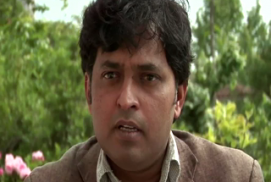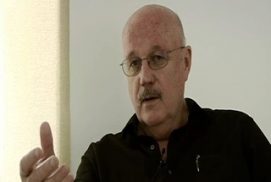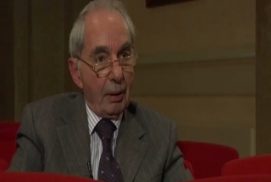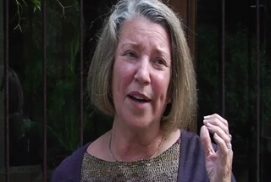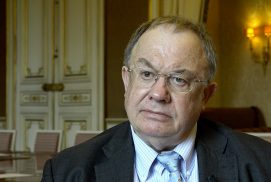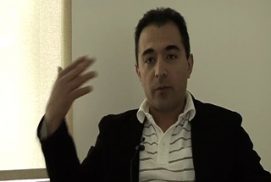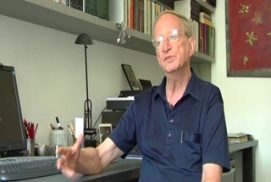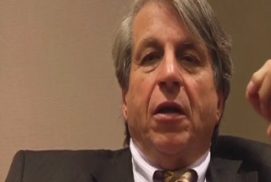
Videos

- Irfan Ahmad 29 September 2010“Muslim intellectuals living in the West, in Europe, have started revising their premises, but it is the European liberals who are not willing to revise theirs,” says Indian Philosopher Irfan Ahmad. And the immigrants themselves, the minorities, how do they feel? “Offer[ing] them equality by asking them to sacrifice their religious particularity” can’t be the way. “More democratization and opening is needed.”
- 20 August 2010«Modernity is a multiple thing and various civilizations have adapted to modernity in completely different ways,» says Professor David M. Rasmussen of Boston College in this Resetdoc video-interview , «Islam has the political resources within it to deal with the modern world. The global principle of justice has to be the principle of toleration.»
- 8 July 2010The last interview with Nasr Abu Zayd in which the great philosopher speaks of his childhood in Egypt, his education, his life as a professor and his battle for a liberal Islam.
- Giuliano Amato 17 June 2010«Resetdoc was created in times when fear of Huntington’s predictions coming true seemed to be quite real and imminent. Fighting against the clash of civilizations was feasible. I saw our association as a sort of bet on Babel,» says the former Italian Prime Minister and member of Resetdoc’s Board of Governors in this Resetdoc video-interview. «Is Babel a sort of tragedy that we are comdemned to, or is it the complete opposite, with diversities living with each other and somehow enriching one other by remaining together?»
- 3 June 2010«Are we talking too much about Religion? I think rather that we should step back and think about why so many political questions are being framed in terms of religion. Controversies around the hijab, the headscarf, in Europe and in Turkey occupy an analogous position to the battles over abortion in the Unites States,» says American critical theorist Nancy Fraser in this Resetdoc video-interview. «In both cases you have a kind of media spectacles around these issues. They are framed in very polarizing ways, and they have a way of sucking up all the oxygen in the atmosphere. They obscurate for example the feminist questions on social rights and health care.»
- 24 May 2010«Islam is being integrated into the West, but just as religion, not as a different culture,» says Olivier Roy, French scholar of Islam, in this Resetdoc interview. «Each country has to recognize Islam just like other religions. We need to integrate Islam within the existing framework and we should have a more open view of the relations between the state, the public sphere and religion. This, precisely because the new religious movements are first of all the expression of individual beliefs and not those of institutions.»
- Nader Hashemi 11 May 2010«Does the term secularism refer to the disestablishment of religion, to atheism, to anti-clericalism, to the robust and complete separation of religion and politics or more narrowly to the separation of the institutions of religion from the institutions of the state? We need some clarity,» says Nader Hashemi, assistant professor of Middle East and Islamic Politics at the Josef Korbel School of International Studies at the University of Denver and the author of Islam, Secularism, and Liberal Democracy (Oxford University Press) in this Resetdoc video-interview. «There are multiple histories of secularism, both in the Western tradition and in the non-Western world. In most Muslim societies today, when people think of secularism, they do not associate it with freedom, democracy or human rights, but with dictatorship and failed economic paradigms.»
- 29 April 2010«There is a lot of diversity out there in the Muslim communities around the world.» explains Farah Pandith, Special Representative to Muslim Communities for the United States Department of State, in this Resetdoc interview, «Violent extremism is not confined to a particular region of the world, and we know for sure that the most credible voices able to push back against that violent ideology are those of Muslim themselves. We need to focus on local level.»
- 19 April 2010«The main trouble with apostasy, the way the Abrahamic religions understand it, is in terms of treason, namely extreme disloyalty to authority. Less than an issue of disbelieving, it is more undermining the political structure that organizes the religion. But it’s a paradox shared by all three religions that their founders (Abraham, Jesus, Mohammad), each turned against his parents, his family and his tribe by bringing the new religion.» A Resetdoc video-interview with Israeli philosopher Avishai Margalit, the George F. Kennan Professor at the Institute for Advanced Study in Princeton. Film by Nikolai Eberth. View the second part of the interview
- 30 March 2010«In the last 50 to 75 years we have entered an era of interdependence. All the challenges we face are interdependent; AIDS, drugs, prostitution, weapons of mass destruction, global immigration, labour markets, you name it, but all the solutions are still wrapped up inside the territory of the nation state,» says Benjamin Barber, president and director of the international NGO CivWorld at Demos and author of Jihad vs. McWorld and Consumed. «We have states and citizens with borders, but problems without borders. How are we going to deal with that unless we find some form of citizens without borders, of democracy without borders?» An interview by Nikolai Eberth.


